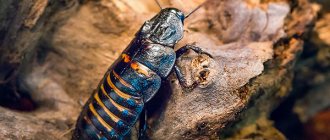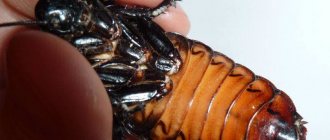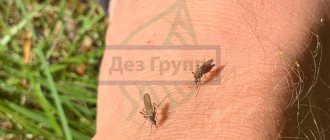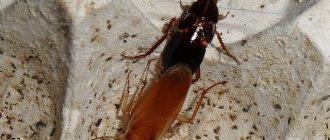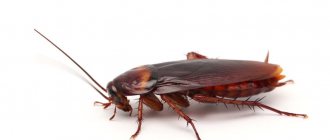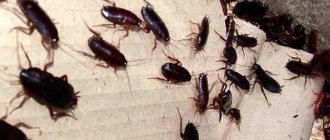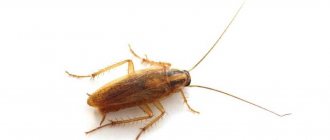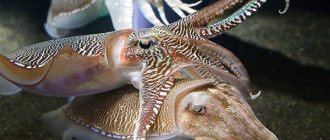Cockroaches, one of the most ancient species of insects, belong to the order Orthoptera. In total, there are about 3,600 species in the world, most of which live in tropical and subtropical climates, in forests. Synanthropic, i.e. There are about 30 species living near humans, of which the most common and the one that brings us a lot of trouble is the red cockroach, also known as the Prusak, as well as the black cockroach. Humanity has been fighting against cockroaches for many years, but we are still losing this war. Insects have the ability to quickly adapt to their environment, and are also distinguished by their viability, because even a lethal dose of radiation is required for them several times more than for a person. But progress does not stand still and currently there are many ways to combat cockroaches.
Keeping cockroaches at home
Keeping cockroaches as pets is a rather exotic hobby, adopted from Asian countries. The most popular are Madagascar hissing cockroaches, which are kept not only as reptile food, but also as low-maintenance pets.
Insectarium
To keep cockroaches at home, you will need a small plastic insectarium or a simple aquarium with 1 liter of free space for one individual. As entertainment, they get 2 individuals, and for breeding - a colony.
In the home of cockroaches, it is necessary to maintain a temperature of at least +25 degrees, and humidity is ensured by regular spraying. The bottom should be covered with a layer of substrate: sawdust, peat or special filler. As a shelter, which cockroaches love so much, they use driftwood or shards of clay pots. The upper edges of the aquarium must be lubricated from the inside with Vaseline, this will protect the pets from rash escape.
What to feed cockroaches?
There should always be fresh food in the access area of cockroaches, and you can create a diet yourself or buy ready-made food, dried daphnia and gammarus. The basis of the diet should be fruits, vegetables and cereals; young leaves of trees, nuts, seeds, eggs, and fermented milk products are given as additional components.
The cockroach home is cleaned once every 2 months. Conditions as close as possible to the microclimate of a tropical forest will ensure your pets have a long and happy life.
Consumption of cockroaches by humans
Humans are also on the list of animals that feed on cockroaches. In Asian and African countries, insect dishes are offered in expensive restaurants. They are specially bred in insectariums. These and similar creatures are considered healthy dietary foods. Small cockroaches are eaten at home, fried in a frying pan. In restaurants and cafes, cockroaches are served in various sauces, both raw and cooked.
The list of those who eat cockroaches is quite small. Prussians are not the main food for anyone. These insects are fed to the inhabitants of terrariums twice a week. Birds, monkeys and rodents eat far fewer pests.
Pet lovers of cockroaches
If the apartment has pets such as snakes, lizards, turtles, then the owner of the terrarium will definitely pamper his pets with cockroach food. You can buy them at a pet store or breed them yourself, which is much cheaper, and nutritious food is always at hand. Sometimes barbels are bought to feed monkeys, birds, and rodents.
Most often, marbled, Turkmen and Madagascar cockroaches are bred at home, which are larger or more nutritious than their relatives. Red and black species are also used as food for reptiles. Insects multiply exponentially and pets are always well fed. They eat whole portions of nutritious protein food.
Dangerous enemies of cockroaches are lizards. Often chameleons are kept in terrariums, which are capable of changing color, masquerading as the color of the environment. Some fans of biological control methods specifically buy several lizards and release them in an apartment. Reptiles quickly deal with harmful insects, eating them until the colony completely disappears. Lizards constantly hide and do not bother their owners as long as there is a food source, then they can move to their neighbors.
Parrots, small monkeys, and chinchillas readily eat barbels. A domestic hedgehog will not refuse crawling protein food. He finds them in crevices and corners, habitats of the colony. Insects are offered to domestic rats, mice, and hamsters as an alternative food. The rat can be temporarily released into the wild and it will partially help solve the pest problem.
Dogs sometimes hunt cockroaches, but they do it more for the sake of play and fun. Longhorned beetles are not their favorite food source. Some owners claim that cats benefit from insects, the chitinous shell of which benefits the cat’s body. And the kitten can have fun and play with the Prussian. These animals eat cockroaches without much pleasure.
Why are red cockroaches dangerous?
Red cockroaches are dangerous because they leave a large amount of their chitinous coverings in the room. These coverings contain a large number of allergens and can provoke chronic runny nose in people living in the same room with cockroaches. Moreover, in most cases, people do not even understand the reasons for this runny nose, they endlessly search for remedies for it, but the reasons, in fact, run around the table at night, hide behind the refrigerator during the day, and then shed or die and leave behind a new portion of allergens.
Moreover, red cockroaches are more dangerous than black ones, since they are more numerous and each individual leaves 7-8 such chitinous shells during its life. That is, red cockroaches leave more allergens in the room than black ones. And therefore it is they who need to be destroyed first.
It is also believed that red cockroaches actively bring dirt and infections into apartments from garbage disposals and other dirt accumulations in the house. But it is impossible to measure this danger and most likely it is exaggerated to one degree or another. Cockroaches do not run directly from the garbage chute into your bread bin, and those individuals that run on tables and bedside tables sit almost right there during the day, at tables and bedside tables.
Red cockroaches, in fact, are not as long-range as they seem. At first glance, it seems that they run very fast and can actually get from the front door to your table in a matter of minutes. But that's not true. You can check for yourself that if you force a cockroach to run a meter in one direction, and then a meter in the other, it runs out of steam and runs much slower.
Plus, in order to get from the garbage chute in the front door to your kitchen and transfer some kind of infection, it needs to overcome a large number of obstacles. That is, cockroaches that actually visit very dirty places and your kitchen in a short period of time are either not present at all, or they are isolated individuals. For the rest, all this dirt falls off their paws or they clean it off themselves before climbing on your food.
A cluster of cockroaches in the kitchen behind the refrigerator - this is where they transfer dirt and dust to food
Consequently, it is currently unjustified to consider cockroaches as epidemiologically significant carriers of dangerous diseases.
Temperature-induced pest control
If it is not possible to remove a small family of pests using chemical means due to your home environment, you can resort to a more cunning method. If you find living creatures in the winter, try to leave the apartment with your family for a few hours. Before leaving, turn off the heating pipes and open all the windows wide. Cockroaches cannot stand the cold and will run away to another place that is more comfortable for them. If the temperature in the apartment drops below 5 degrees, the pests will die along with the laid eggs. The freezing method has proven itself well in practice, but it is worth considering that the method has its drawbacks. At such a low temperature, an incident may occur with the heating system. It is also worth taking care of indoor plants in advance. It is in flower pots and soil that insects can hide and survive. In such an environment they will continue to reproduce and feel good
It is also important to understand that laid eggs may be in a place inaccessible to frost. You can try this method, if only to significantly reduce the number of adult individuals. The remaining cockroaches will have to be removed using a more effective method.
You can get rid of pests using proven home methods.
It is important to understand that the process is not easy, but the result will be worth it. Often, experienced housewives resort to traps using boric acid.
This composition destroys pests and even completely solves problems in a relatively short period of time.
Egg and potato. Boil a chicken egg hard. Remove the yolk and grind with 1 boiled potato tuber. Add 50 g to the ingredients. boric acid. Make small balls from the resulting mass. Dry the product near the heating device. After this, spread the bait throughout the apartment. Don't worry, this composition is absolutely safe for pets and people.
Sugar and flour. Use a container of a suitable size and combine granulated sugar, boric acid, and flour in it in equal quantities. Add a small amount of water to the ingredients. As a result, you should have a dense dough. Next, proceed according to the above scheme. Roll into balls and distribute around the perimeter of the apartment overnight.
Boric acid and water. You can resort to a simpler method. Dissolve a small amount of the chemical composition in running water and place the container in the kitchen near the sink
In this case, it is important to completely isolate the insects’ path to other sources of liquid. As a result, the cockroaches will be poisoned in the homemade drinking bowl.
Boric acid
Some housewives simply sprinkle a chemical composition on areas where pests live. The most common areas to include are vents, bathrooms, kitchens, sinks, trash cans, and baseboards.
Starch and vanillin. Combine 40 grams in a common container. boric acid, 4 gr. vanilla and 65 gr. starch, powdered sugar. Add a small amount of water to make a sticky paste. Apply the product to cardboard and place such a trap throughout the house. Pests cannot resist such a delicacy, and then die.
House plants. Indoor flowers are no less popular in the fight against insects. Some of these representatives emit a rather unpleasant odor for pests, and humans do not feel anything. This will require small bouquets. Hang decorations throughout the apartment in areas where cockroaches gather. Among such plants, eucalyptus, mint, elderberry, lemon balm, wild rosemary and chamomile are effective.
Citrus zest. This method cannot be accurately called effective, although experienced housewives claim otherwise. To get rid of the problem, just place citrus fruit zests throughout your apartment. The specific smell repels cockroaches, so they will not get to your products.
Getting rid of cockroaches is not as difficult as it might seem at first glance. To fix the problem, you should familiarize yourself with simple rules and safety precautions. If you don’t want to bother yourself, you should seek help from specialists. Otherwise, household products sold in the store will help you.
It is also worth paying attention to proven folk methods
How to get into the house
To date, many ways have been identified for cockroaches to enter people's homes. If you have never noticed the presence of Prussians before and one night you came across them in the kitchen, then you should think about where they came from.
You may be able to drive away or destroy the first identified batch of Prussians, but if you do not find the channel of their entry and do not block it, they will begin to appear again and again.
The most common sources of cockroach infestations can be the following:
- flatmates living in unsanitary conditions;
- bags and packages from stores;
- things from long trips;
- postal items: parcels and letters.
Advice! If you were on a business trip or used a train to cover the distance, then upon arriving home, carefully inspect the suitcase itself and the things in it for cockroaches.
Description of cockroaches
Not all people have encountered cockroaches in practice, and therefore they are interested in what these insects look like:
- Cockroaches have a flat oval body reaching up to 10 cm in length. The insect's belly consists of 9 dorsal segments and 8 abdominal ones. The body color is light with yellowish-brown elytra.
- Winged and wingless varieties of these insects live in nature. Winged species have 2 pairs of wings, but they cannot fly long distances.
- Prussians have 6 legs and have spikes on their hips and shins. The limbs of the insect are developed and designed for fast running. In one second, a cockroach can move 75 cm, constantly changing direction. Therefore, it is difficult to catch it with your hands.
- The head of the Prussian is also flattened, made in the shape of a triangle. The jaws are strong with chitinous teeth adapted for gnawing food. The mouthparts are facing downwards.
- The eyes are large, consisting of 2 simple ocelli.
- The Prusak is equipped with a long, sensitive mustache. They are bristle-like and consist of parts.
We invite you to read: White spirit for bedbugs
What cockroaches can you eat?
There are more than 4 thousand species of cockroaches, and only a small fraction of them are parasitic forms and pests. This also applies to our home species. Most often, Madagascar cockroaches, one of the largest species, are used for this exotic (at least for us) food. They are also called hissing for the characteristic sounds they make.
Both scientists and chefs do not recommend eating our home-grown red Prussians, since they are not good for health. Not only does the Prussian eat literally everything, but he also crawls in the sewers, where pathogens are infested. If such an insect is swallowed alive, you can get a lot of troubles like E. coli and other diseases, and in addition, it will try to get out, which is also unpleasant. Therefore, if there is a child in the house at an age when babies put everything in their mouth, it is necessary to urgently get rid of domestic insects. If a cockroach accidentally falls into a pot or frying pan, then after heat treatment there will be no harm from it. And if you see it on your plate, it’s your own business - eat it or throw it away.
By the way, despite the name, the Prussians have nothing to do with Prussia; they were brought from South Asia - and that is why they are so sensitive to the cold. Few people eat them at all, and if your cat or dog caught such a cockroach and tasted it, it is only because they are obligate predators, that is, they experience a primitive desire to hunt. The domestic cat actually hunts mice for the sake of the process itself, and not for food.
But all sorts of exotic pets like lizards, scorpions or large spiders love to feast on cockroaches - but, again, not all of them. For these pets, live large barbel beetles are purchased as food in special pet stores.
The vast majority of other cockroaches are edible. But they must be properly processed before you start cooking.
Cockroaches are like waste processing plants
- China's expanding cities are producing more food waste than they can handle in landfills, and cockroaches may be a way to get rid of mountains of food waste, providing nutritious food for livestock when bedbugs eventually die and, some say, cure stomach ailments and cosmetics procedures.
- On the outskirts of Jinan, the capital of eastern Shandong province, a billion cockroaches are fed 50 tons of kitchen waste a day, equivalent to the weight of seven adult elephants. This is only at one plant.
- The waste arrives before dawn at the plant, where it is conveyed through pipes to the cockroaches in their chambers.
- In total, four recycling plants are needed to process a third of the kitchen waste produced in the city of about seven million people.
- A nationwide ban on the use of food waste as pig feed due to outbreaks of African swine fever is also fueling the growth of the cockroach industry.
- Cockroaches are a biotechnological way to recycle kitchen waste. Cockroaches are also a good source of protein for pigs and other livestock. It's like turning waste into resources.
- There are other Chinese entrepreneurs with similar ideas, selling cockroaches to pig and fisheries as feed, and to pharmaceutical companies as medicinal ingredients. This is of great economic importance.
- Elsewhere in Sichuan, Gooddoctor raises six billion cockroaches. They are used to make medicines to treat mouth ulcers and ulcers, skin wounds and even stomach cancer.
- Researchers are also exploring the possibility of using cockroach extract in cosmetic masks, diet pills and even in the treatment of hair loss.
- At Gooddoctor, when the cockroaches reach the end of their lives around six months, they are steamed, washed and dried before being sent into a huge tank for nutrient extraction.
- When asked about the likelihood of cockroaches escaping, experts say that it would be worthy of a disaster movie. Precautionary measures have been taken at the plant. They have a moat with water and fish. If the cockroaches escape, they will fall into the moat and the fish will eat them all.
What do cockroaches love most?
As mentioned earlier, cockroaches can eat absolutely anything. Unlike people, they do not go overboard with food, since for them they are only a means of survival, nothing more. Despite this, insects still have preferences. A real treat for them, for example, is:
- bread – both black and white;
- sugar. Yes, yes, cockroaches also love sweets;
- absolutely any cereal - rice, buckwheat, corn, wheat, and so on;
- vegetables and fruits;
- meat in any form - both raw and cooked;
- candies and other sweets.
The thing is that in the absence of their favorite food, cockroaches are quite capable of eating anything. As an example, here are just a few “dishes” that they can easily use to satisfy their hunger:
- any products made of genuine leather;
- body care lotion;
- shoe polish. Moreover, its chemical composition does not matter;
- wood glue;
- book bindings. If you have an extensive library, the cockroach will definitely not die of hunger;
- paper;
- absolutely any waste from the table, including those that have long since gone rotten in the trash can.
As you can see, it is almost impossible to limit an insect's access to food, since it is able to find food anywhere. Almost the same situation with water. But even if you manage to hide absolutely everything that the pest eats, it will be able to starve for a whole month without any damage to itself.
Contrary to popular belief, cockroaches do not eat bedbugs. These insects are quite capable of getting along in the same apartment, and their interests often do not intersect at all. The thing is that the favorite habitat of cockroaches is the kitchen, and bedbugs prefer to live in rooms with upholstered furniture.
Do cockroaches bite people? As a result of research conducted back in the sixties of the last century, several such cases were identified. Basically, insects bite when they cannot find water or food, or when the available food is not enough for a huge colony of pests. Such situations are very rare.
Recommendations from professionals
The fight against cockroaches must be taken very seriously, because only we ourselves can rid our apartments of all “evil spirits.” Cockroaches, once they have taken root in a house, are far from easy to remove; it requires a lot of effort and diligence. These insects are terrible pests, they harm not only your products, but also your health, spread various diseases, spoil your mood and cause disgust.
Remember that cockroaches in an apartment prefer a kitchen that is not too clean, keep it clean and tidy, do not throw away leftover food, because even an uneaten sandwich or a piece of bread left on the table at night will turn into a “feast” for cockroaches. In the period until the insects are completely destroyed, it is necessary to isolate their access to water and food as much as possible, and carefully treat the room. Also take preventative measures, especially if you know there are insects nearby. If you find cockroaches in your apartment, immediately begin exterminating them.
Life cycle of cockroaches
Almost all species of cockroaches are oviparous insects. A female cockroach only needs one contact with a male for her to fertilize and lay eggs repeatedly.
There are several stages of development of cockroaches:
- formation of the larva (inside the egg);
- nymph (larva);
- adult cockroach (imago).
Cockroaches do not have a stage at which the larvae turn into pupae, which is characteristic of most arthropods. This development cycle is considered incomplete.
Almost before the appearance of the nymphs, the female carries eggs with future larvae in a reservoir (ootheca) adapted for this purpose, located on her stomach. When the larvae are fully formed, it dumps it in an inaccessible place, protected from outside interference.
The speed of development and appearance of the nymph depends on the room temperature and relative air humidity - the larva will hatch from the egg faster at higher levels. Before turning into an adult, it molts several times, while the color of the insect darkens each time, and the shell becomes harder.
Insects have different lifespans. For example, for red cockroaches, which are called Prussians, on average it varies from 10 months to 12, and black cockroaches live from one and a half to two years.
Features of life
All cockroaches are insects with an incomplete development cycle. This means that their larva closely resembles the adult stage in appearance and must shed its skin several times before reaching maturity. As a rule, they molt 6 times within 2-3 months. In total, the lifespan of an insect rarely exceeds one year. Individuals of the black species live no more than 6 months.
These insects eat anything that they can bite off a piece of and that their strong stomachs can digest. These can be food remains from a human meal, paper, skin, fabric, and even hair and pieces of epidermis. These unpretentious creatures will be able to soak themselves everywhere. It is much more important for them to have a source of moisture. They can live no more than a week without water, although they can last at least a month without food.
Domestic cockroaches, despite having developed wings, do not fly, although they are able to glide with their help if they fall from a wall. They do not like sunlight and only come out of their hiding places at night when people are sleeping.
Do pet cockroaches bite? This question worries many people whose home has been invaded by these insects. They can calm down; the mouthparts of the cheeky invaders are too small to cause any harm to humans. Although in the absence of food, they can bite off pieces of the epidermis from the skin. Most often, young children are subject to such attacks.
Habitats
Everything in the world is interconnected. If there are cockroaches, “it means someone needs it” and is definitely useful. After all, most species live in wildlife, and only a limited number, called synanthropic ones, live in houses.
Scientists believe that human acquaintance with these insects began hundreds of thousands of years ago, when people began to seek shelter for protection from wild animals and a place for a more comfortable living for the tribe. They settled in caves, displacing tigers, bears, bats and birds, but cockroaches remained adjacent to people. Leftover food, humidity and constant temperature have become the most necessary and favorable conditions for their life. Habitat of the cockroach The total number of species of cockroaches and related insects exceeds 4000. They love warmth and moisture, so most of them live in the tropics.
Cave brothers lost their color and became almost white and blind due to the constant lack of sunlight necessary for pigmentation. And the relict forest cockroach, living in the south of the Primorsky Territory, is listed in the Red Book of Russia.
Their sizes range from 4 mm to 9 cm. The largest live in Colombia, and in Russia the largest cockroach, called the Saussure tortoise, has a length of 5 cm and lives in the desert part of Central Asia, but is also found in the Caspian steppes.
Living conditions of the Prussians
Favorable conditions for cockroaches are:
- warm,
- humidity,
- abundance of food.
Favorite places to stay: catering units, kitchens, bakeries, canteens, restaurants, breweries and other food industry enterprises. In residential buildings and apartments, they most often prefer to live in kitchens and bathrooms. nodes. But as populations grow, they spread to other areas.
Cockroaches lead a secretive lifestyle . During the day they hide in various places (behind furniture and equipment). In the evening and at night they leave their shelters in search of food and water. Cockroaches are very sensitive to temperature. At 0 degrees Celsius, adults and larvae go into suspended animation and may die. The lifespan of a red cockroach is about 8 months.
What smell are cockroaches afraid of?
Red and black insects have whiskers, with the help of which they perceive various aromas and search for food. Pests also use their antennae for orientation.
Some housewives use compounds and plants that have an unpleasant odor to fight. Before choosing a specific option, determine what odors arthropods are afraid of.
Among the popular and popular means are:
- Ammonia. Ammonia has a rather pungent odor. This composition is added to warm water and treated with it on indoor surfaces.
- Vinegar. Many housewives wonder whether domestic cockroaches are afraid of vinegar. Since this substance has an unpleasant and pungent aroma, they react strongly to it. It is introduced into water, and also treated on tables and window sills, floors and walls. Treatment of other surfaces is also allowed.
- Bleach and chlorine-containing compounds. Arthropods react negatively to bleach. They are afraid of the white that some housewives use when cleaning floors.
- Plants. Apartment owners use plants to repel arthropods. Among all types, preference is given to geranium or decorative lemon.
If you consider what grass cockroaches are afraid of, the fight will be more successful:
- Tansy.
- Sagebrush.
- Bay leaf.
- Mint and lemon balm.
Such vegetation is used in dry form. To do this, prepare bags of gauze or bandage. Such bags are laid out in secluded places and on window sills so that the entire room is saturated with this smell. After all, insects sense strong aromas.
Cockroaches are still pests
Ubiquitous insects run throughout the kitchen at night, visit other rooms and leave traces everywhere.
In addition to the contamination of the apartment with excrement points and old shells, proximity to them is fraught with many consequences:
- The shells shed by nymphs are highly allergenic, which is especially dangerous for people with asthmatic diseases. If there is an overgrown pest population in the apartment, irritation of the respiratory tract inevitably occurs.
- On those objects that insects run over, particles of dirt remain. Cockroaches can easily turn clean dishes, food and cutlery into breeding grounds for infection. There is no doubt about this, given the possibility of their migration from the garbage chute.
- Like many other insects, cockroaches are capable of carrying pathogens and even helminth eggs. Infection can occur through a pet chewing or eating a cockroach.
- Starved cockroaches can also attack a person, gnawing off the upper layers of his skin. Although rare, such attacks are something to be wary of. If a person is individually intolerant to the composition of cockroach secretions, complications are possible.
- Cockroaches spoil everything that seems edible to them. Their effect is especially noticeable on consumer electronics, where they can damage wires. Gradual contamination of electronic boards with feces will also affect the operation of the product.
- The psychological effect is also important. Many people lose normal sleep knowing about insects swarming nearby. And the appetite disappears at the thought of dishes “trampled” by cockroaches.
You need to get rid of these insects immediately: the appearance of more and more individuals will not be long in coming.
Housing unfriendly to cockroaches
- Wash dishes often and do not leave them overnight.
- Daily removal of organic waste from the house.
- Thorough wiping of kitchen equipment - both countertops, oven, refrigerator, etc.
- Storing food in closed containers made of glass, plastic or ceramics.
- Thorough cleaning of the bathroom, removing soap and cosmetics.
- Cleaning pet food containers and closing them after use.
ALSO CHECK >> How to check if there are bedbugs in my house?
Animals that love to eat cockroaches
Natural enemies include not only reptiles, wild birds and arachnids. There are also small animals that happily eat barbels.
American cockroach close upHedgehog
When studying the question of which animal eats cockroaches, the spiny creatures are first considered. Hedgehogs eat whiskered pests in the natural environment, as well as at home if a person keeps them as pets. Such animals are omnivores.
And this is not the only food. Hedgehogs also love fruits and sometimes attack reptiles and amphibians.
Hedgehogs use cockroaches for food
Chickens
The diet includes seeds, plants, worms, small vertebrates, and insects. Interestingly, domestic chickens are very fond of cockroaches. In addition, the bird can spend hours digging the soil, where it looks for food sources - seeds, large insects.
Chickens love to eat pests
Turtles
They represent a group of reptiles. There are many species of turtles, but not all of them will eat cockroaches. Thus, there are large individuals, among them herbivores (land) and predators (freshwater). Moreover, representatives of both species sometimes include food unusual for them in their diet. Arthropods (cockroaches, among others) can form the basis of food for turtles that are raised at home (representatives of small-sized species).
Pay attention to turtles - animals used by many as pets
An insect is running around the apartment - a cockroach or a Prussian: who can tell the difference?
You are wondering how cockroaches and Prussians differ, then let’s review the main differences:
- color is the main argument, because ordinary “stasiks” are mostly black, but a red, brown tint indicates the appearance of this subspecies;
- size is an equally important detail; if you notice a huge cockroach on the wall, then this is a cockroach, since Prussians are a small species of insects;
- the inability to bite, because the pest’s jaws are underdeveloped, but there are cases of reports of bites of simple cockroaches;
- the presence of two dark stripes on the front of the chest also distinguishes the red pest from the usual one.
In all other respects, the parasites are similar in behavior and living conditions.
Argentine cockroach - what kind of animal is it?
Of course, this is not an animal at all, but quite a full-fledged insect from the order of cockroaches, the Blattelidae family. So that you understand the scale of my childhood despair when my hand plunged into a basin with live food, the size of this creature reaches 4.5 cm in length. The cockroach's homeland is South America and New Guinea, where, like our ants, they densely inhabit the forest floor.
The burrowing lifestyle in the natural environment requires special conditions of detention - both larvae and adult Argentine cockroaches need a substrate in which they can burrow. The male and female are very different in appearance: females are somewhat wider and more rounded, and males have wings with which they can fly short distances.
If for some reason you have decided to start breeding these creatures, then here is a list of arguments in favor of this decision:
- the Argentine cockroach does not hiss or chirp like other cockroaches or crickets;
- it does not have an unpleasant odor (yes, some other species do);
- the cockroach is slow - even if it can get out of its home, it will not be able to run far;
- in some ways they are even beautiful - dark, glossy, with brown-orange spots. Why not an exotic pet?
Depending on the breeding goals, this species also has a disadvantage: slow development. Compared to other species, for example, the marbled or Turkmen cockroach, the Argentine cockroach develops quite slowly. The individual reaches sexual maturity only at seven months, and the female carries an ootheca, according to various sources, from 30 to 60 days. The insect is viviparous; two to three dozen young will appear from one ootheca. The Argentine cockroach lives on average two years; a female can produce offspring about 5 times during her life.
What's wrong with people who raise cockroaches?
Everything is fine with them, there is no reason to worry and see a psychiatrist. Cockroach farming usually has two purposes: either keeping the insect as an exotic pet, or breeding the same insect as food for another exotic pet. If in the first case questions may arise (well, really - you can’t even play with him or cuddle with him), then the second case is completely justified.
Breakfast of a champion - protein bar, oh, cockroach
Do you know why the Argentine cockroach is an ideal food for some pets? Because it's super nutritious. Each individual consists of approximately 36% protein, which is perfectly digested and absorbed. Typically, insects are fed several times a week, but immediately before feeding the pet, it is customary to thoroughly fatten several pieces during the day.
In general, not an insect, but a real treasure, which will also be useful to those who are joked about by colleagues and friends because of their reverent love for exotic creatures: just imagine what a sensation an Argentinean planted in the pocket of an ill-wisher will create. I’m kidding, of course, you can’t mock living beings, and I’m not talking about people now.
Morphological description
The Argentine cockroach blaptica dubia is medium in size and has pronounced sexual dimorphism. Body length 40-45 mm. The male is slimmer and has long, dark wings with orange spots at the base. The female is more rounded, dark brown with orange spots at the base of the abdominal segments. The wings have atrophied, only small rudiments remain. Their length is about 1 cm. The limbs are reddish, densely covered with spines. Males are capable of short flight from elevated ground; they cannot take off from a flat surface.
How do they reproduce?
In terms of reproducing their offspring, these insects are very prolific, since domestic cockroaches reproduce much more intensively than their wild relatives. One female lays up to 40 eggs at a time, which she carries around in an edema - a capsule covered with a durable shell. In total, during her entire life she is capable of laying up to 10 such bags. To fertilize a female, it is enough to meet the male only once. Subsequently, she uses the seed material preserved in her body from the first copulation.
The larvae, or nymphs as they are also called, hatch 2-4 weeks after the female has laid eggs in the ooteca. Their chitinous shell is very delicate and contains virtually no pigment. Over time, it hardens and becomes increasingly darker in color. After 2-3 months, having gone through a certain number of molting stages, the nymphs acquire wings and are already capable of reproduction.
Interesting fact! Cockroaches have remained virtually unchanged throughout the 300 million years they have lived on the planet. This is confirmed by fossils of ancient insects found in pieces of amber.
Appearance
Red cockroaches are typical representatives of their order. The general external similarity, as well as behavioral characteristics, are usually similar between all representatives of this type of insect, including the Madagascar and American pests, which some exotic connoisseurs like to breed as pets.
Cockroaches are found all over the world, but they have different names everywhere. In Russia, the common people call the red barbel a Prusak. There is a version that the pest received this name because of its connection with Germany and the war with Napoleon. It was then that these insects were brought to Russia through the territory of Prussia. In addition to apartments, insects can be found in fields. This species is called the Bernstein cockroach. The structure of the red cockroach also has similar features to other representatives of the cockroach suborder:
- They all have a cephalothorax, abdomen and head.
- The entire body, except the head, is hidden under the wings. The most interesting thing is that these pests cannot fly, but actively use their wings, for example, when falling from a height.
- In addition, insects are very tenacious - even radiation does not kill them.
- The antennae are a very important organ of the cockroach body. With their help, insects recognize the location of food supplies, and the antennae are also a means of communication between individuals. If at least one antennae is lost or injured for any reason, the barbel is deprived of the ability to navigate the surrounding world.
- As for size, the body of females is somewhat larger than that of males, but at the same time they have a shorter abdomen. Perhaps this is due to the fact that it is more convenient for females to bear offspring. An adult red barbel can reach a length of one to one and a half centimeters. Compared to other species, the red pest is a rather small species.
- Since ancient times, the so-called cerci, which are two tail-like processes, have been preserved on the body of red long-horned beetles. The color of all representatives of cockroaches is almost the same, with some exceptions. As a rule, the body has a brownish-red color.
- The insect weighs two tenths of a gram. Another relative of the red cockroach that feels great in the apartment is the black cockroach. Externally, they differ only in color. You can compare the red and black cockroaches from the photo.
General idea of red cockroaches
Some very general information: the red cockroach is the most characteristic representative of its family, even if it is relatively small. It has a body structure typical of all cockroaches, leads a typical lifestyle, and looks like the most average cockroach.
Interesting fact: in Russia, red cockroaches began to actively spread during the era of the Napoleonic wars, and the appearance of these insects here was associated with the appearance of troops from Prussia. That's why red cockroaches were called Prussians. In English they are called the German Roach, that is, the German cockroach, that is, when European scientists gave the species a name, they believed that it appeared and spread from Germany. In Germany, on the contrary, this species was called Russian cockroaches. But none of these origin theories were correct.
We are often asked...
